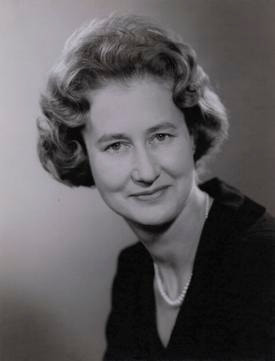PRISCILLA BUCHAN, BARONESS TWEEDSMUIR OF BELHELVIE (1915-1978)

Priscilla Buchan, Baroness Tweedsmuir of Belhelvie PC was a Scottish Parliamentarian and Unionist MP for Aberdeen South for twenty years before becoming a Life Peer and member of the House of Lords. She is widely regarded as being one of the pioneering female parliamentarians and ministers.
Priscilla Jean Fortescue Thomson was born on 25 January 1915 the daughter of Brigadier Alan F. Thomson DSO, of Craighall, Kennethmont. In 1934, aged 19, she married Major Sir Arthur Lindsay Grant of Monymusk, 11th Baronet, an officer in the Grenadier Guards. He was killed in action in 1944. They had two daughters.
Two years after being widowed, Lady Grant of Monymusk stood unsuccessfully for Aberdeen North in the July 1945 General Election. In 1946, following the resignation of Sir Douglas Thomson, she held the Aberdeen South constituency for the Conservatives. She gained over fifty percent of the vote (a feat she repeated in each subsequent election until she was defeated in 1966). In 1948, she married the 2nd Baron Tweedsmuir and was, thereafter know as Lady Tweedsmuir. The Tweedsmuirs had one daughter.
In 1957, she gave the Loyal Address following the State Opening of Parliament. She started by extolling the strengths of Scotland in the United Kingdom. She then set out the challenges facing the country, including the forging of a new relationship with Europe based on trade and co-operation, the creation of a new defence able to respond to Russian aggression and the growing of the economy, fusing the gigantic resources of the old world to the new. She then discussed the cost of living and the reform of the Upper House, and finished by advocating the advantages of having more women parliamentarians.
The response Lady Tweedsmuir received from the then Leader of the Opposition is less able to stand up to contemporary scrutiny. Mr Gaitskell replied to the Commons that she had probably made some good points but that, alas, he had been unable to respond to any of them, such had been the distraction of her soft, attractive voice. So struck was he that he felt that, despite being a grandmother, she was rather easy on the eye, and he had found it impossible to concentrate on anything she said. This incident was quoted extensively in 2014 by Penny Mordaunt MP who became (fifty-seven years after Tweedsmuir only the second woman MP to give the Loyal Address).
She was a delegate to the Council of Europe from 1950 to 1953, a UK Delegate to the General Assembly of the United Nations 1960–1961. She gained her first ministerial post in 1962 when she was appointed Joint Parliamentary Under Secretary of State for Scotland, a post she held until the fall of the Conservative government in 1964.
Lady Tweedsmuir lost her Aberdeen South constituency at the 1966 General Election. However, she was elevated to the House of Lords on 1 July 1970 when she was created a Life Peer as Baroness Tweedsmuir of Belhelvie, of Potterton in the county of Aberdeen. The title commemorated that of her husband (Tweedsmuir) and her home in Aberdeenshire (at Belhelvie).
She served in the government of Edward Heath as Minister of State at the Scottish from 1970 to 1972, and at the Foreign and Commonwealth Office from 1972 to 1974. She was sworn of the Privy Council in 1974. After the Conservatives went into opposition in 1974, she was appointed as Principal Deputy Chairman of Committees in the House of Lords and served in that post for three years until 1977. She was as Chairman of the Select Committee on European Communities, 1974–1977, and was a Deputy Speaker of the Lords.
Baroness Tweedsmuir of Belhelvie died of cancer on 11 March 1978, aged 63. A memorial service was held in St Machar’s Cathedral for Lady Tweedsmuir in May 1978. She was described in 1983, was 'the best' female MP Britain had had by veteran Labour politican, Emanuel Shinwell.
Entry written by Peter Reid.
Priscilla Jean Fortescue Thomson was born on 25 January 1915 the daughter of Brigadier Alan F. Thomson DSO, of Craighall, Kennethmont. In 1934, aged 19, she married Major Sir Arthur Lindsay Grant of Monymusk, 11th Baronet, an officer in the Grenadier Guards. He was killed in action in 1944. They had two daughters.
Two years after being widowed, Lady Grant of Monymusk stood unsuccessfully for Aberdeen North in the July 1945 General Election. In 1946, following the resignation of Sir Douglas Thomson, she held the Aberdeen South constituency for the Conservatives. She gained over fifty percent of the vote (a feat she repeated in each subsequent election until she was defeated in 1966). In 1948, she married the 2nd Baron Tweedsmuir and was, thereafter know as Lady Tweedsmuir. The Tweedsmuirs had one daughter.
In 1957, she gave the Loyal Address following the State Opening of Parliament. She started by extolling the strengths of Scotland in the United Kingdom. She then set out the challenges facing the country, including the forging of a new relationship with Europe based on trade and co-operation, the creation of a new defence able to respond to Russian aggression and the growing of the economy, fusing the gigantic resources of the old world to the new. She then discussed the cost of living and the reform of the Upper House, and finished by advocating the advantages of having more women parliamentarians.
The response Lady Tweedsmuir received from the then Leader of the Opposition is less able to stand up to contemporary scrutiny. Mr Gaitskell replied to the Commons that she had probably made some good points but that, alas, he had been unable to respond to any of them, such had been the distraction of her soft, attractive voice. So struck was he that he felt that, despite being a grandmother, she was rather easy on the eye, and he had found it impossible to concentrate on anything she said. This incident was quoted extensively in 2014 by Penny Mordaunt MP who became (fifty-seven years after Tweedsmuir only the second woman MP to give the Loyal Address).
She was a delegate to the Council of Europe from 1950 to 1953, a UK Delegate to the General Assembly of the United Nations 1960–1961. She gained her first ministerial post in 1962 when she was appointed Joint Parliamentary Under Secretary of State for Scotland, a post she held until the fall of the Conservative government in 1964.
Lady Tweedsmuir lost her Aberdeen South constituency at the 1966 General Election. However, she was elevated to the House of Lords on 1 July 1970 when she was created a Life Peer as Baroness Tweedsmuir of Belhelvie, of Potterton in the county of Aberdeen. The title commemorated that of her husband (Tweedsmuir) and her home in Aberdeenshire (at Belhelvie).
She served in the government of Edward Heath as Minister of State at the Scottish from 1970 to 1972, and at the Foreign and Commonwealth Office from 1972 to 1974. She was sworn of the Privy Council in 1974. After the Conservatives went into opposition in 1974, she was appointed as Principal Deputy Chairman of Committees in the House of Lords and served in that post for three years until 1977. She was as Chairman of the Select Committee on European Communities, 1974–1977, and was a Deputy Speaker of the Lords.
Baroness Tweedsmuir of Belhelvie died of cancer on 11 March 1978, aged 63. A memorial service was held in St Machar’s Cathedral for Lady Tweedsmuir in May 1978. She was described in 1983, was 'the best' female MP Britain had had by veteran Labour politican, Emanuel Shinwell.
Entry written by Peter Reid.



